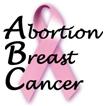International Women's Coalition Urges Media to Report Abortion Breast Cancer Research Objectively
March 7, 2001
An international women's organization whose objective is to prevent breast cancer caused by induced abortion urged the media to report the abortion breast cancer research objectively.
Mrs. Karen Malec, president of the Coalition on Abortion/Breast Cancer, said, "Dr. Joel Brind, Ph.D. has identified 27 out of 34 worldwide studies published since 1957 linking abortion with breast cancer. Thirteen of 14 U.S. studies implicate abortion as a risk factor. Seventeen are statistically significant. Five studies show a more than twofold increased risk."
"Our organization is pro-life for women," asserted Mrs. Malec. "Unfortunately, when it comes to this politically incorrect information, not everyone is pro-women's health. This information has been covered up for 44 years."
Detractors of the research showing that abortion raises breast cancer risk maintain that retrospective studies (interview based studies) are flawed because of a phenomenon called recall bias. This theory says that breast cancer patients are more likely to admit to having had abortions than healthy women are, thus causing more breast cancer patients than healthy women to appear to have had abortions. If this phenomenon really exists, then many thousands of retrospective epidemiological studies examining the link between any stigmatized risk factor and a disease (i.e. cervical cancer and multiple sex partners) are seriously flawed.
Mrs. Malec reported that, "The truth is that several teams of scientists have tested for recall bias, but none has ever established any direct evidence of it. Nevertheless, opponents of the abortion-breast cancer link persistently act as if recall bias were a fact." The truth is that a 1989 prospective study -- one based on a computerized registry of fetal death certificates -- done by Howe et al reported a 90% increased risk. Nevertheless, detractors of the studies showing increased risk continue to assert that prospective studies are needed."
The Royal College of Obstetricians and Gynecologists issued a warning to its abortion providers last year that the Brind review and meta-analysis was methodologically sound and that the abortion-breast cancer research "could not be disregarded." 1.
Mrs. Malec added that,
"The 1997 Melbye study, whose bottom line was that 'induced abortions have no overall effect on the risk of breast cancer,' was discredited by both the Brind team and Senghas and Dolan 2. Nevertheless, the abortion industry, the National Cancer Institute and the American Cancer Society continue to point to its conclusions denying a link between abortion and breast cancer as final 'proof' that abortion does not cause breast cancer. This is an amazing assertion considering what scientists already acknowledge to be true: (1) that estrogen promotes the growth of both normal and abnormal breast tissue during pregnancy and is known as a secondary carcinogen; and (2) that postponement of first FULL TERM pregnancy increases breast cancer risk."
The New England Journal of Medicine which published the Melbye study four years ago subsequently admitted evidence of an abortion-breast cancer link. An article by Katrina Armstrong in February of 2000 identified abortion as a "risk factor" which was "less consistently associated with breast cancer." This should be a clue to Melbye's supporters that this journal's editors no longer back Melbye.
Mrs. Malec provided the following facts about the 1997 Melbye study:
1) Melbye reported under the section entitled "Results" that breast cancer risk increases with gestational age by 3% per week even within the first trimester, with an 89% risk elevation for abortions occurring at more than 18 weeks gestation.
2) Melbye misclassified more than 60,000 women who had abortions and identified them as not having had abortions.
3) 1.5 million women were studied, but 1.2 million were healthy and hadn't had abortions.
4) 281,000 had induced abortions and most were too young to get breast cancer -- some were teenagers.
5) 10,000 women studied were breast cancer patients, but most were too old to have their abortion histories included in computerized records. Abortion was legalized in Denmark in 1938, but the abortion registry goes back to only 1973. In 1973, the oldest women in the study who had developed breast cancer were only 38.
Mrs. Malec contended that "It is ironic that the Center for Reproductive Law and Policy has suggested that this debate should be over because the Melbye study was, after all, allegedly "definitive," and it purportedly determined, once and for all, that there is no abortion-breast cancer link. An expert for a group of abortion providers represented by the Center for Reproductive Law & Policy, Dr. Lynn Rosenberg, a Boston Medical School epidemiologist, testified in a Florida case late in 1999 about the research. When asked by an attorney whether a pregnant 15 year old who aborts her pregnancy has a higher risk of breast cancer than one who carries her pregnancy to term, Dr. Rosenberg answered,
'Probably, yes.' " 3.
Mrs. Malec asserted that
"An important question to be addressed, is: Have abortion politics and greed caused women to be excluded from this debate about the abortion-breast cancer research for 44 years?"

